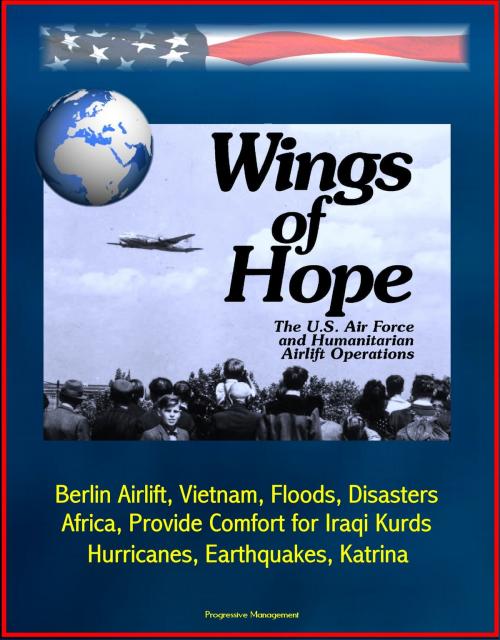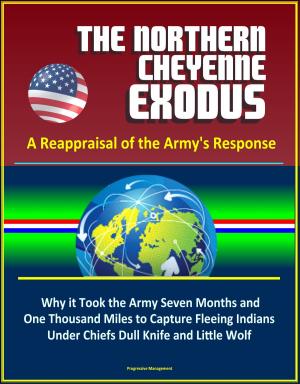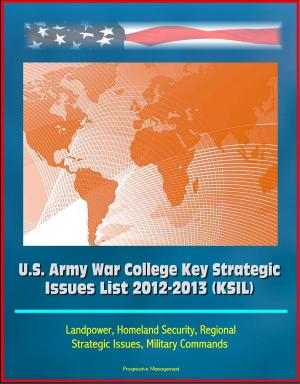Wings of Hope: The U.S. Air Force and Humanitarian Airlift Operations - Berlin Airlift, Vietnam, Floods, Disasters, Africa, Provide Comfort for Iraqi Kurds, Bosnia, Hurricanes, Earthquakes, Katrina
Nonfiction, History, Military, Aviation, Social & Cultural Studies, Social Science| Author: | Progressive Management | ISBN: | 9781310549892 |
| Publisher: | Progressive Management | Publication: | August 23, 2015 |
| Imprint: | Smashwords Edition | Language: | English |
| Author: | Progressive Management |
| ISBN: | 9781310549892 |
| Publisher: | Progressive Management |
| Publication: | August 23, 2015 |
| Imprint: | Smashwords Edition |
| Language: | English |
Professionally converted for accurate flowing-text e-book format reproduction, this U.S. Air Force (USAF) book reviews the long and honorable history of humanitarian airlifts - part of a well-established tradition dating back three-quarters of a century to the early days of military flight.
The victims of recent wars and atrocities in Somalia, Bosnia-Herzegovina, and northern Iraq have captured the world's attention. The United States has responded to their cries for help by carrying out humanitarian relief operations to these and other areas devastated by natural or man-made disasters. The compassionate codenames chosen by U.S. policymakers for these operations—Provide Comfort, Provide Hope, Provide Promise, Provide Relief, and Restore Hope—signify the nation's determination to alleviate the suffering of those less fortunate than itself. On the heels of its spectacular and decisive role in the Gulf War, the United States Air Force has demonstrated its immense capability to airlift tons of supplies and personnel in a wide variety of highly significant relief efforts.
The Air Force's humanitarian operations received wide attention during the 1990s, as they will for years to come. The nation's first airmen recognized early on aviation's potential for alleviating the effects of natural disasters. As early as September 1919, Army Air Service planes from Kelly Field, Texas, dropped food supplies to marooned flood victims along the Rio Grande. On a few occasions during the 1920s, American aviators bombed their own country—for good cause. They delivered ordnance against ice jams in the Delaware, Platte, and Susquehanna rivers to prevent flooding, save bridges, and restore navigation. In March 1929 at least twenty-one airplanes from Maxwell Field, Alabama, delivered twenty-seven tons of food and other supplies to flood victims in the southern part of the state.
The Army flew several dramatic relief missions during the 1930s. In 1932 bombers dropped supplies to Navajo Indians who had become snowbound by severe blizzards in Arizona. In December 1935 the 5th Bombardment Group bombed the Mauna Loa volcano, diverting its lava flow away from Hilo, Hawaii. In 1936 Air Corps squadrons flew food and other supplies to flood victims in Pennsylvania and the following year to southern Illinois. During February 1939 the Army air-delivered medical aid in the wake of an earthquake in Chile.
Professionally converted for accurate flowing-text e-book format reproduction, this U.S. Air Force (USAF) book reviews the long and honorable history of humanitarian airlifts - part of a well-established tradition dating back three-quarters of a century to the early days of military flight.
The victims of recent wars and atrocities in Somalia, Bosnia-Herzegovina, and northern Iraq have captured the world's attention. The United States has responded to their cries for help by carrying out humanitarian relief operations to these and other areas devastated by natural or man-made disasters. The compassionate codenames chosen by U.S. policymakers for these operations—Provide Comfort, Provide Hope, Provide Promise, Provide Relief, and Restore Hope—signify the nation's determination to alleviate the suffering of those less fortunate than itself. On the heels of its spectacular and decisive role in the Gulf War, the United States Air Force has demonstrated its immense capability to airlift tons of supplies and personnel in a wide variety of highly significant relief efforts.
The Air Force's humanitarian operations received wide attention during the 1990s, as they will for years to come. The nation's first airmen recognized early on aviation's potential for alleviating the effects of natural disasters. As early as September 1919, Army Air Service planes from Kelly Field, Texas, dropped food supplies to marooned flood victims along the Rio Grande. On a few occasions during the 1920s, American aviators bombed their own country—for good cause. They delivered ordnance against ice jams in the Delaware, Platte, and Susquehanna rivers to prevent flooding, save bridges, and restore navigation. In March 1929 at least twenty-one airplanes from Maxwell Field, Alabama, delivered twenty-seven tons of food and other supplies to flood victims in the southern part of the state.
The Army flew several dramatic relief missions during the 1930s. In 1932 bombers dropped supplies to Navajo Indians who had become snowbound by severe blizzards in Arizona. In December 1935 the 5th Bombardment Group bombed the Mauna Loa volcano, diverting its lava flow away from Hilo, Hawaii. In 1936 Air Corps squadrons flew food and other supplies to flood victims in Pennsylvania and the following year to southern Illinois. During February 1939 the Army air-delivered medical aid in the wake of an earthquake in Chile.















